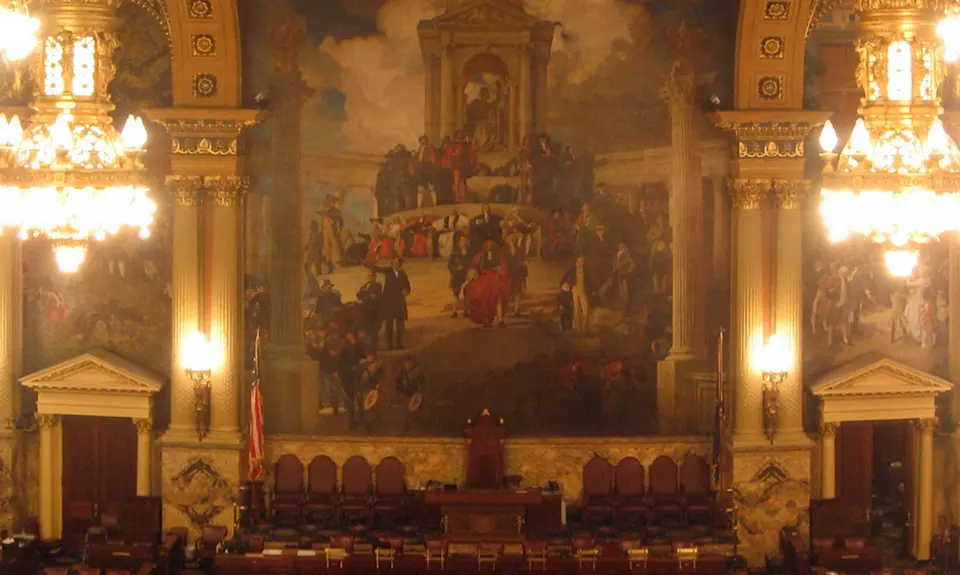People For the American Way Foundation and allied organizations filed a friend-of-the-court-brief on March 1 in a Third Circuit case known as Fields v. Speaker of the House. We argue that the Pennsylvania State House has engaged in disturbing and unconstitutional discrimination by excluding nontheistic chaplains from its opening prayers. Our introduction follows below. Click here to download a PDF copy of the full brief.
STATEMENT OF INTEREST OF AMICI CURIAE
Amici are religious and civil rights organizations that represent diverse beliefs, experiences, and faith traditions, and share a commitment to religious freedom and to ensuring that all Americans are free from religious discrimination, coercion, and governmental endorsement of religion.
To the extent state legislative bodies invoke U.S. Supreme Court legislative prayer precedent to open their sessions with prayer, amici oppose the denial or exclusion of any public official, clergy member, or community member from a legislative prayer opportunity based on that person’s faith tradition or belief system. Such exclusion, which is at issue in this case, is religious discrimination and cannot be reconciled with the principles of religious diversity, pluralism, and freedom from persecution on which the United States was founded.
Thus, amici have a substantial interest in this case, which places at issue their core concern with preserving religious liberty and preventing religious discrimination with respect to legislative prayer.
The amici are:
- Anti-Defamation League
- Central Conference of American Rabbis
- Hindu American Foundation
- Interfaith Alliance Foundation
- Jewish Social Policy Action Network
- Keshet
- Men of Reform Judaism
- National Council of Jewish Women
- OCA—Asian Pacific American Advocates
- People For the American Way Foundation
- T’ruah: The Rabbinic Call for Human Rights
- Union for Reform Judaism
- Women of Reform Judaism
Detailed descriptions of amici appear in the accompanying Addendum.
Pursuant to Fed. R. App. P. 29(a)(2), all parties have consented to the filing of this brief.
Pursuant to Fed. R. App. P. 29(a)(4)(E), the undersigned certifies that: (i) no party’s counsel authored this brief in whole or in part; (ii) no party or party’s counsel contributed money that was intended to fund preparing or submitting this brief; and (iii) no person other than the amici curiae, their members, or their counsel contributed money that was intended to fund preparing or submitting this brief.
SUMMARY OF ARGUMENT
The “clearest command of the Establishment Clause is that one religious denomination cannot be officially preferred over another.” Larson v. Valente, 456 U.S. 228, 244 (1982). The Pennsylvania House of Representatives (the “House”)1 has violated this command by excluding nontheistic chaplains from participating in the opening prayer of legislative sessions. This overt and categorical exclusion of persons of certain faiths and belief systems is both disturbing and unconstitutional for two main reasons.
First, the House’s position that it may exclude nontheistic belief systems from legislative prayer violates the plain language of the Establishment Clause, which prohibits legislative favoritism and discrimination among religions. Indeed, taken to its logical conclusion, the categorical exclusion of nontheists from legislative prayer opportunities would impermissibly open the door to discrimination against any religious minority whose views do not accord with legislators’ tailored “preferences.”
Here, there is no factual controversy over the preferential and discriminatory motives behind the House’s legislative prayer practices. Multiple House members and officials were explicit in declaring their intention to exclude faiths and belief systems that do not subscribe to a “divine” or “higher” being. The House’s brief does nothing to distinguish or explain these statements; to the contrary, it endorses the espoused discriminatory motive as constitutionally permissible. This, standing alone, is sufficient to affirm the District Court’s holding that the policy is unconstitutional.
Second, the House’s reliance upon “historical standards of diversity”—in other words, that no nontheist gave a legislative prayer in the early years of the republic—does not bring the House’s discriminatory practices into harmony with the Establishment Clause. The absence of nontheists (or other minority faiths) from historical offerings of legislative prayer does not constitute evidence of affirmative exclusion from such prayer. Nor does it convey the Founders’ approval of religious favoritism, particularly where the contemporaneous evidence of the Founders’ disapproval of religious discrimination is abundant. Moreover, like other discriminatory practices once tolerated but now rightly seen as constitutionally impermissible, state exercises of religious bias and marginalization cannot be justified based on putative historical exclusion. Many historically underrepresented beliefs are widely exercised today, and the House cannot properly point to their historical absence to rationalize discrimination against America’s evolving religious diversity.
For these reasons, this Court should reject the House’s attempt to exclude from legislative prayer belief systems it finds disagreeable on religious grounds and affirm the District Court ruling.
